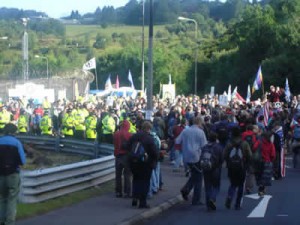Faslane Nuclear Base Blockade
Eyewitness account - Zuky Serper
Waking up at 3am has never been an easy task…
We left at dawn, early Monday morning in coaches from the campsite in Craigmillar, Edinburgh.
After a long journey we reached the North Gate of Faslane Royal Navy base. The picture was taken at 07:46. It shows hundreds of protesters in the North Gate, ready for action in their blockade positions, sipping militantly their morning teas and munching cakes with a terrible crunching sound of their jaws. More coaches were on the way. Police vans were moving in. A tense moment followed any movement on the chessboard.
Suddenly, a contingent broke away from the main gathering and started to march down towards the two Oil Depot Gates. On the lead was the samba band and rangers from the Clowns Army. We got information that the South Gate is blocked. Thus, all roads leading in and out of the base were closed by the blockade, effectively paralysing the operation of the base. Every gate established a sit-down human barrier, food and drinks provided and music for entertainment. Shortly after, we had some speakers addressing the public and a dance party followed.
There was a good disorganised organisation: Shuttle vans connected the gates with each other and we were able to move easily, join their activities and be everywhere; we were everywhere, walking along the barbed wired fences, following the Clowns Army marching left, left, left left left, visiting the Faslane Peace Camp, enjoying music and chats, amazed by the protester who was sitting on top of the thorny barbed wire, surrounded by police on the ground below and an accompanying trumpeter. Later in the afternoon we left and travelled back home, tired but happy.
 Water - Not Wars
Water - Not Wars
No Wars - No Nukes
Make Poverty History
Scrap Trident
Bread - Not Bombs
Custard Creams - Not Cluster Bombs
The Big Blockade
Trident - £48 Every Second
Nuclear Is A Luxury We Cannot Afford
Make Lunch - Not War
But we also argued a strong political case. These words above were gleaned from the banners in Faslane. People who came to blockade the nuclear submarines base saw the clear link between nuclear arms, wars and poverty and we wanted to convey this message broadly. The organisers of the days of protest against G8 world order did well to programme a day of action against nuclear weapons and war ø. It was important to highlight the issue after the big Make Poverty History march, demanding the abolition of all nuclear weapon systems, stop altogether arms manufacturing and sales.
Another addressee were those in the movement who tried to sanitise the fight against poverty from any relation to an economy of arms manufacturing and wars, an economic order that subsidise an army at war in Iraq and Afghanistan, but not debt relief and clean water free of charge (that is: not privatised). The message was clear: rich nations inflict wars on poor people, nuclear weapon exists on the expense of poor people’s lives, resources taken from relieving poverty; aid for poor nations transform into mal-aid to buy arms; the cost of one second of maintenance of Trident system - £48 (=$83) - is more than a monthly wage for half humanity; we already know that half the world – nearly three billion people – live on less than $2 a day. It was important to make thi cs link visible and the Faslane day of action achieved it.
Those who decide things in the naval base, under the pressure of the anticipated blockade, made a decision to call the day off for workers, shutting it for incommers. This move proves the value of a broad inclusive mobilisation of forces, united around a just call, supported by organised workers (Unison-Scotland). It was not limited to the few brave warriors only; anyone who wanted to come could do so. And indeed we came, 2000 of us! This conjuncture of efforts we have seen in Stop the War Coalition could serve the movement well in future actions. It is not surprising that the policing during the day was carefully designed not to use brute force (that has been used generously during the Carnival for Full Enjoyment and partly in Gleneagle); the authorities knew that the blockading people are backed ? by large social movements and communities and were committed to non-violent action; any act of state brutality directed at its citizens protesting against what largely perceived a just cause - against nuclear weapons - would entail a damaging backlash for them. Otherwise, how could we explain members of the police adopting the (almost) sympathetic faces of social workers? or maybe somewhere under their uniforms they were also thinking about their role in the constellation of wars, nuclear armaments and poverty?
Last thing: there is a call to stop in September the biggest arms fair in Europe - DSEi - from taking place in East London. Globalise Resistance is encouraging supporters and members to join forces with organisations and local communities. We do not need more arms sales.
We also do not need more bombs in London.







